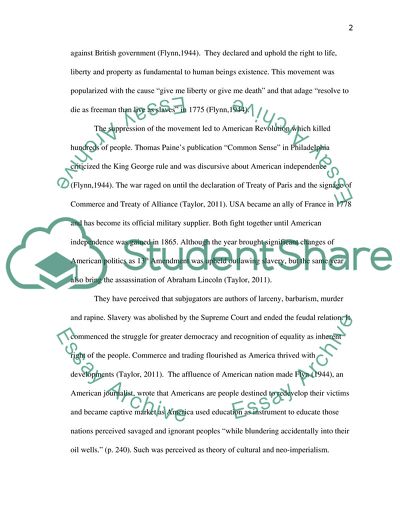Cite this document
(How Have Wars Resulted in Transition from US Isolationist Foreign Policy to a Global Superpower Literature review Example | Topics and Well Written Essays - 2000 words, n.d.)
How Have Wars Resulted in Transition from US Isolationist Foreign Policy to a Global Superpower Literature review Example | Topics and Well Written Essays - 2000 words. https://studentshare.org/history/1763450-how-have-wars-and-political-ideologies-resulted-in-the-transition-from-an-isolationist-foreign-policy-in-america-to-one-in-which-the-nation-is-now-a-global-superpower
How Have Wars Resulted in Transition from US Isolationist Foreign Policy to a Global Superpower Literature review Example | Topics and Well Written Essays - 2000 words. https://studentshare.org/history/1763450-how-have-wars-and-political-ideologies-resulted-in-the-transition-from-an-isolationist-foreign-policy-in-america-to-one-in-which-the-nation-is-now-a-global-superpower
(How Have Wars Resulted in Transition from US Isolationist Foreign Policy to a Global Superpower Literature Review Example | Topics and Well Written Essays - 2000 Words)
How Have Wars Resulted in Transition from US Isolationist Foreign Policy to a Global Superpower Literature Review Example | Topics and Well Written Essays - 2000 Words. https://studentshare.org/history/1763450-how-have-wars-and-political-ideologies-resulted-in-the-transition-from-an-isolationist-foreign-policy-in-america-to-one-in-which-the-nation-is-now-a-global-superpower.
How Have Wars Resulted in Transition from US Isolationist Foreign Policy to a Global Superpower Literature Review Example | Topics and Well Written Essays - 2000 Words. https://studentshare.org/history/1763450-how-have-wars-and-political-ideologies-resulted-in-the-transition-from-an-isolationist-foreign-policy-in-america-to-one-in-which-the-nation-is-now-a-global-superpower.
“How Have Wars Resulted in Transition from US Isolationist Foreign Policy to a Global Superpower Literature Review Example | Topics and Well Written Essays - 2000 Words”. https://studentshare.org/history/1763450-how-have-wars-and-political-ideologies-resulted-in-the-transition-from-an-isolationist-foreign-policy-in-america-to-one-in-which-the-nation-is-now-a-global-superpower.


